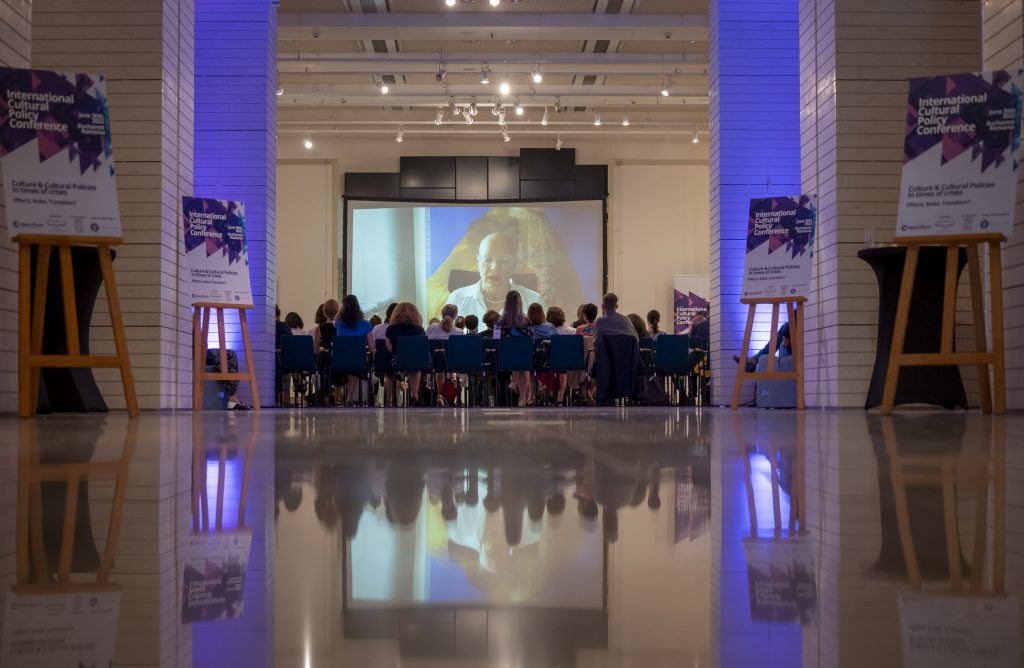
Summary
Crises as current descriptions of the state of our society formed the framework of this year’s international cultural policy conference of the Compendium of Cultural Policies and Trends. The international monitoring system for cultural policy together with the Romanian National Institute for Cultural Research and Training as host, organised the conference “Culture & Cultural Policies in Times of Crises. Effects, Roles and Transition” in Bucharest on the 30th of June 2022. More than 120 participants from over 30 European countries from cultural policy research and cultural policy, but also from cultural practice, accepted the invitation to discuss this relevant issue.
The title already indicates the ambitious three-step process with a focus on culture and cultural policy: Assessment of the crises and its impacts, discussion of tasks and roles as well as possible implementation and mediation possibilities – formulated in concrete terms: How do the respective crises affect the cultural sector and cultural policy in the different countries? What role can the cultural sector and cultural policy take to counter the respective crises? And what possible strategies, instruments, and goals can and should the cultural sector or cultural policy apply?
The conference began with a contextualization: after a cautionary introduction to the current challenges for cultural policy and culture in the face of multiple crises – and in particular, those that do not find a place in the reporting in Western Europe, presented by Milena Dragicevic-Sésic from Belgrade – the focus was on three of the most important crises affecting us today and their impact on the field of culture and cultural policy:
- The war in Ukraine, which is a humanitarian and democratic crisis in Europe – very powerfully illustrated in a live link to our Ukrainian Compendium colleague Oleksandr Butsenko,
- The COVID-19 pandemic, which is disrupting and changing social and economic systems around the world – via a presentation of cultural statistics on the impact of Corona in various countries in Europe by the director of the Budapest Observatory Péter Inkei,
- And the climate crisis threatening the social and ecological future and well-being of all people – presented by Giuliana De Francesco from Rome.
Eloquent statements testified to the role culture and cultural policy can play in times of crisis. Kathrin Merkle from the Council of Europe very impressively pointed out the opportunities but also the tasks of culture and cultural policy in democracies – especially in times of crisis. The European Network of Observatories in the Field of Arts and Cultural Education emphasised the role of cultural education. Andreas Wiesand defended the role of cultural policy research using the example of studies on freedom of artistic expression.
In the subsequent discussion, the potential of culture as an “out-of-the-box thinking and approach” to break up heterogeneous patterns of meaning and to bring the unthinkable back into the discourse was once again brought up by the participants. It was also emphasised once again that culture and cultural policy play an eminent role in the recognition, dissemination and communication of certain social values that favour finding solutions.
Due to the complexity of the crises, the diversity of the starting points in the European countries and their respective priorities in dealing with the crises, it was not the aim of the third part of the conference to develop a common strategy, but rather to present and discuss different specific approaches and instruments with which culture and cultural policy have already contributed to social change and the solution of (partial) crises. The hosts presented their work on the Romanian cultural strategy as a concrete method, speakers and participants from numerous different regional and working contexts reported on “their” good practice examples in the fishbowl format – including the basic income for cultural workers in Ireland, new forms of monitoring in the Netherlands (see also the News article) or an overview of European best practices and policies for sustainability in art and culture – contributed by colleagues from Finland.
Keynote, images and video material
Thanks to the enormous efforts of the Universitatea Nationala de Arta Teatrala si Cinematografica I.L. Caragiale, we are pleased to announce the arrival of the video fottage of the conference. We also like to thank the photographers Andrei Gindac and Ciprian Zinca for their fantastic work, which you can find here.
Did you miss our conference in July? Then, take a closer look and listen to the keynotes and discussions of our speakers Milena Dragićević-Šešić (Presentation), Péter Inkei (Presentation), Giuliana De Francesco (Presentation), Susanne Keuchel, Andreas Wiesand (Presentation), Carmen Croitoru, and Adrian Debattista.
In the context of the General Assembly, the coordinator team also shared the Compendium’s annual report 2022 informing about it activities and developments within 2022.
